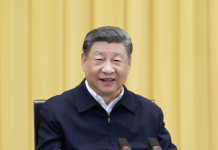BEIJING: A year on from being declared a UNESCO World Heritage Site, the old tea forests in Jingmai Mountain, Yunnan province, are abuzz with activity as the first shoots of the new picking season begin to sprout.
Life hasn’t been the same for Yue Paxian and her friends from Jingmai village in Pu’er after the Cultural Landscape of Old Tea Forests of Jingmai Mountain was included on the UNESCO World Heritage List on Sept 17 last year.
As a result of the global honor, sales of the local tea have been booming, and despite the increased pressure on demand, the tea farmers are sticking to their tradition of only picking tea in spring and autumn.
“We all know that if we don’t continue to cherish Jingmai Mountain just as our ancestors did, our happy lives today may one day be lost,” said Yue. “Each tea leaf carries the gift of nature and the wisdom of our ancestors.”
Jingmai is the world’s first cultural heritage site related to tea, owing to its unique history of tea cultivation.
Unlike ordinary tea gardens, here tea trees grow among the forests with minimal human interference. Tall trees help shade tea plants from strong sunlight, and grass, twigs and leaves keep the soil lush. Bugs and birds help in pest control.
The nine ancient villages in the area, mainly inhabited by the Blang and Dai ethnic groups, have maintained a harmonious relationship with the forest for over 1,000 years.
Back in the 10th century, a tribal leader from the Blang ethnic group discovered the place and stumbled upon the medicinal qualities of the wild tea. –The Daily Mail-China Daily news exchange item






